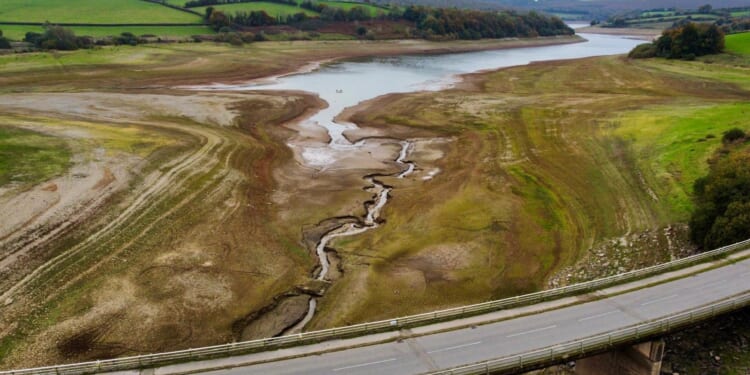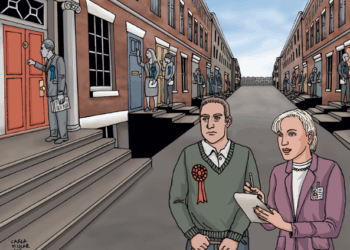James Wright is a farmer, agri-tech entrepreneur and policy director of the Conservative Rural Forum. He stood as the parliamentary candidate at the 2024 general election.
Wimbleball Reservoir, which serves over 300,000 homes and businesses across the South West, now sits at under a third of its capacity. Its exposed muddy bed is a warning, not of drought or climate change, but of a country that hasn’t built a major reservoir in 23 years.
The message, for those willing to see it is, is clear. We are sacrificing long-term survival to vested interests and short-term political boosts. Successive governments have designed the system pathologically against delivery of our most fundamental needs, water, energy, housing, and transport.
Even worse, it signals to investors and wealth creators that Britain is no longer a safe or sensible place to build.
I once helped a business secure planning permission for an expansion that would have created dozens of jobs. It took 18 months and over £20,000 in fees. Meanwhile, Donald Trump received permission and began construction on a new ballroom at the White House in a matter of weeks.
Capitalists are not altruists. There is risk involved in deploying capital, and investors want a return commensurate to that risk. Ask yourself, if you had millions to invest, would you choose a country where every project faces years of delay?
Regulatory burden is not inherently benign. The research is clear: regulation correlates with slower job creation and lower productivity. A government-commissioned study by the OECD found that “overly strict regulations can reduce job flows, have a negative impact on employment of some groups of workers (notably youth) … and hinder productivity and economic growth.”
Of course, regulations originates from good intentions. You can make a case for any new rule introduced but there is probably no better example against our current system than the Lower Thames Crossing: 4.2 kilometres of tunnel, and already costing £300 million in planning application alone. By contrast, Norway’s Skaugum Tunnel, a 3.8-kilometre twin-track rail tunnel built outside Oslo, cost roughly £35 million to build in today’s money.
It’s not just the regulations themselves; it’s bodies that administer them too. Dozens of quangos, each demanding different data and pursuing different goals, none aligned with ministers or their departments. When you think you’ve won, some group will pop up with a judicial review, which has become the weapon of last resort adding years and millions in cost to even the most straightforward infrastructure project.
The regulatory ratchet, every well-meaning diktat adds another rule, but none are ever repealed. Each new regulation feels virtuous, the instinct to “do something” feels right. It is government of ‘good vibes’, but it creates what might be called a Samaritan’s Dilemma of the State, endless acts of well-intentioned protection that cumulatively trap the very people and businesses they were meant to help.
We don’t have long – the next government must grasp back control. The first step begins by putting ministers with real world experience back in charge of running departments. They must hold the levers of the state again and not have to shepherd their own ideas through the system.
We should scrap the majority quangos, restore the office of the Lord Chamberlain, cut off judicial review, and bring decision making back into accountable, elected hands. This will mean beefing up ministerial private offices, appointing more expert special advisers, and creating the capacity to drive reform rather than manage decline.
Most importantly, we need to break the state to remake it. That means a something like a Great Repeal Act, one act that would be a legislative clear out. It would have transparent criteria to wipe away decades of accumulated regulation.
If would take decades to debate each regulation, you can make a sensible case for why we should have an MOT every 12 months but instead lets extend it to 24 months and embrace the economic benefits, we must do this with all sorts of regulation.
Elected representatives must be able to deliver and be destroyed at the ballot box if they fail. The current system, where every decision can be challenged by judges who do not share those electoral interests, has paralysed Britain.
Whoever wins the next election must make this the moment. If we can fix the paralysis, we can fix Britain’s ability to build, to unlock investment, create jobs, and most importantly, have economic growth which the average person feels.








![Donald Trump Slams Chicago Leaders After Train Attack Leaves Woman Critically Burned [WATCH]](https://www.right2024.com/wp-content/uploads/2025/11/Trump-Torches-Powell-at-Investment-Forum-Presses-Scott-Bessent-to-350x250.jpg)


![Kamala Comes Unglued, Makes Bogus Claim About Her Landslide Loss to Trump [WATCH]](https://www.right2024.com/wp-content/uploads/2025/10/Kamala-Comes-Unglued-Makes-Bogus-Claim-About-Her-Landslide-Loss-350x250.jpg)





